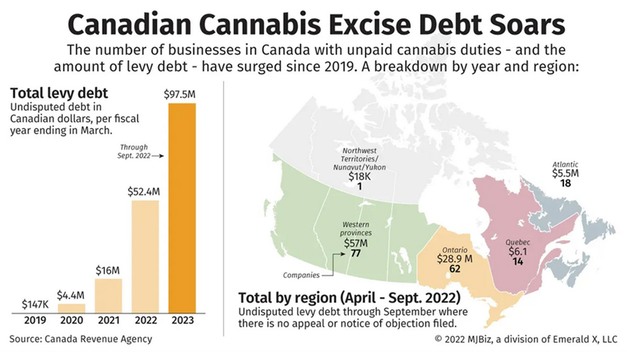"I often find myself contemplating the future and envisioning what the cannabis landscape could be if the government took a fresh perspective," says Beena Goldenberg, CEO of Organigram. "The challenges I'm about to discuss aren't just about numbers; they're about the livelihoods of those involved and the potential for an industry to not only thrive but become a leader on the global stage. So, let's unravel these challenges together, not just as problems but as opportunities for positive change," she says.
Beena Goldenberg
The impact of excise duty on a struggling industry
"A recent survey by the Cannabis Council of Canada reveals that licensed producers are losing as much as 35% of their gross sales to excise duties. From a consumer standpoint, this means that approximately 25% of the price they pay for a cannabis product is a duty – I suspect many consumers don't even know that so much of their purchase price is a hidden 'tax,' so to speak," Beena says
"This heavy burden is a result of incorrect assumptions made pre-legalization with respect to the price of cannabis. This assumption and the resulting impact on the Federal Government's excise policy has stifled growth and negatively impacted cannabis producers' ability to operate. To put this in human terms, we saw one of Canada's largest Licensed Producers (LPs) cut 60% of its workforce in early 2023, from over 4000 to under 1500 and another decrease from 2700 to just over 1300 in 2023– and this only represents the direct job losses of 2 LPs – there are many other direct job losses, not to mention indirect job losses for those who work with the cannabis industry as service providers and suppliers," she says.
"We've also seen an escalating number of excise duty payment defaults, with 70% of licensed producers now owing excise debts to the Canada Revenue Agency (CRA). These losses emphasize the urgent need for reform to the excise framework to secure the industry's financial stability."
"Excise duties, which generate close to $1.5 billion annually for the government, are not only forcing companies to be in arrears but are also pushing companies into bankruptcy, with a staggering 41% of companies filing for CCAA protection in 2022 being cannabis companies, and a further 12% in 2023," Beena says.
"What's more, the excise duty burden on cannabis is disproportionately high compared to alcohol, hindering the industry's competitiveness. A comparison reveals that the percentage of duty on cannabis flower is over 10 times that of wine, 6 times that of beer, and twice that of spirits per unit of consumption."
An infographic showing the number of businesses in Canada with unpaid cannabis duties – and the amount of levy debt – broken down by year and region. From April - Sept 2022, the western provinces have a total levy debt of $57M, the Northwest Territories a debt of $18K, Ontario a debt of $28.9M, Quebec $6.1M, and the Atlantic provinces $5.5M. The total levy debt across Canada in 2019 was $147K, in 2020 $4.4M, in 2021 $16M, in 2022 $52.4M, and in 2023 $97.5M. Source: the Canada Revenue Agency.
Leveling the playing field
"Amid these challenges, charting a course forward demands urgent reforms to ensure the survival and prosperity of the Canadian cannabis industry. The existing excise framework, a major impediment to industry progress, requires a significant reduction in the duty rate. A proposed reduction to a 10% fixed rate of gross sales, tailored to the realities of a new industry competing with an established illicit market, could be one way to alleviate some of the burden," Beena continues.
"Furthermore, a pivotal change in the point of excise collection is advocated, shifting the responsibility from Licensed Producers to provincial agencies at the point of sale, mirroring the successful model in the beverage alcohol industry. This shift would support cash flow for LPs and allow them to avoid the upfront tax payment burden at the point of packaging."
"These reforms will not only save jobs and increase government revenues but also empower companies to develop innovative products that attract even more consumers to the legal market, which is ultimately in everybody's best interest whether you are an LP, a retailer, or the Government," Beena concludes.
For more information:
Organigram
organigram.ca
